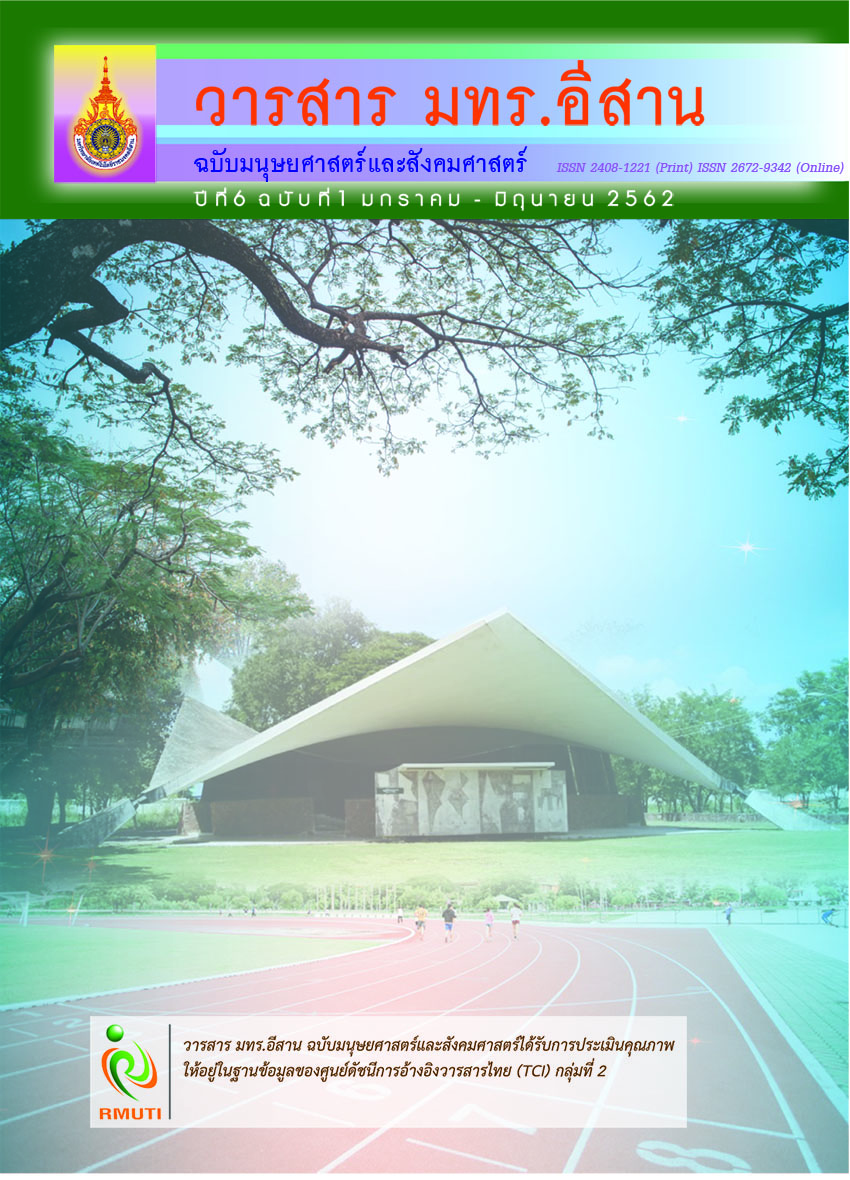Development Direction for Non-Smoking University by Project and Community Based Research
Main Article Content
Abstract
The purposes of this research were to 1) study the direction to non-smoking university by project and community based research, 2) study the effects of using instructional project and community based through non-smoking university. The samples group were 1) 10 directors and experts and 2) 50 undergraduate students of Suan Dusit University, enrolled in the course of Information Integration in the first semester of the academic year 2017. Data were analyzed by using mean, and standard deviation. The results of this research were as follows: 1. the direction to non-smoking university by project and community based research consisted of 5 components as followed: 1) policy and management, 2) Teaching and learning management by community participation, 3) the roles of universities, teachers, students, and communities, 4) instructional activities by projects and community based research, and 5) project process evaluation. The process of learning activities were 6 steps: 1) building community readiness and cooperation, 2) building knowledge for non-smoking universities by community participation, 3) resources allocation, 4) project process operation to be a non-smoking university, 5) the scaff oldings of the concerned persons, and 6) presentation of the operating results summary and reflection. 2. The effects of using instructional project and community based was appropriate in a high level (= 3.87, S.D. = 0.50). In each aspect, it was at a high level, and can be sorted in ascending order as follows; student role (
= 3.93, S.D. = 0.56), community role (
= 3.91, S.D. = 0.53), non-smoking university by project and community based research (
= 3.88, S.D. = 0.58), teaching and learning activities (
= 3.85, S.D. = 0.52), instructor role (
= 3.83, S.D. = 0.59), and evaluation (
= 3.76, S.D. = 0.74).
Article Details
บทความที่ได้รับการตีพิมพ์เป็นลิขสิทธิ์ของมหาวิทยาลัยเทคโนโลยีราชมงคลอีสาน
ข้อความที่ปรากฏในบทความแต่ละเรื่องในวารสารวิชาการเล่มนี้เป็นความคิดเห็นส่วนตัวของผู้เขียนแต่ละท่านไม่เกี่ยวข้องกับมหาวิทยาลัยเทคโนโลยีราชมงคลอีสานและคณาจารย์ท่านอื่นๆในมหาวิทยาลัยฯ แต่อย่างใด ความรับผิดชอบองค์ประกอบทั้งหมดของบทความแต่ละเรื่องเป็นของผู้เขียนแต่ละท่าน หากมีความผิดพลาดใดๆ ผู้เขียนแต่ละท่านจะรับผิดชอบบทความของตนเองแต่ผู้เดียว
References
จุรีย์ อุสาหะ ฐิติพร กันวิหค เศรณีย์ จุฬาเสรีกุล และวิไลลักษณ์ หฤหรรษพงศ์. (2558). การสังเคราะห์อภิมานงานวิจัยปัจจัยป้องกันพฤติกรรมการสูบบุหรี่ในเยาวชนไทย. วารสารควบคุมโรค. ปีที่ 41, ฉบับที่ 4, หน้า 271-284
ชรีย์พร ภูมา. (2554). การพัฒนารูปแบบการเรียนรู้แบบทุกที่ทุกเวลาเพื่อการแลกเปลี่ยนเรียนรู้ของชุมชนนักปฏิบัติในการทำโครงการเพื่อสร้างนวัตกรรมเทคโนโลยีวัสดุศาสตร์ของผู้ประกอบการวิสาหกิจขนาดกลางและขนาดย่อม (SMEs). วิทยานิพนธ์ปริญญาครุศาสตรดุษฎีบัณฑิต สาขาวิชาเทคโนโลยีและสื่อสารการศึกษา จุฬาลงกรณ์มหาวิทยาลัย
ฐิติยา เนตรวงษ์. (2553). การพัฒนารูปแบบการเรียนร่วมเพื่อสร้างชุมชนการเรียนรู้ออนไลน์และผลสัมฤทธิ์ทางการเรียนวิชาเทคโนโลยีสารสนเทศสำหรับนักศึกษาปริญญาบัณฑิต. วิทยานิพนธ์ปรัชญาดุษฎีบัณฑิต สาขาวิชาเทคโนโลยีและสื่อสารการศึกษา จุฬาลงกรณ์มหาวิทยาลัย
นนทรี สัจจาธรรม. (2555). ทัศนคติและความตั้งใจในการเลิกสูบบุหรี่ของนักศึกษาวิทยาลัยราชพฤกษ์. กรุงเทพฯ: มหาวิทยาลัยราชพฤกษ์
บัวพันธ์ พรหมพักพิง นิลวดี พรหมพักพิง พะเยาว์ นาคำ เกษราภรณ์ คลังแสง ภัทรพร ศรีพรหม และพรเพ็ญ ปานคำ. (2550). เศรษฐศาสตร์การเมืองเรื่องการควบคุมบุหรี่. กรุงเทพฯ: ศูนย์วิจัยและการจัดการความรู้เพื่อการควบคุมยาสูบ (ศจย.)
พนัส พฤกษ์สุนันท์ รัชชานนท์ ศุภพงศ์พิเชฐ และมันทนา บัววัฒนา. (2554). กระบวนการเรียนรู้แบบมีส่วนร่วมของชุมชนในการพัฒนาเมืองน่าอยู่ เทศบาลตำบลปราณบุรี จังหวัดประจวบคีรีขันธ์. กรุงเทพฯ: กรมอนามัยศูนย์อนามัยที่ 4
มูลนิธิรณรงค์เพื่อการไม่สูบบุหรี่. (2558). คู่มือดำเนินงานโรงเรียนปลอดบุหรี่. กรุงเทพฯ: มูลนิธิรณรงค์เพื่อการไม่สูบบุหรี่ สำนักงานกองทุนสนับสนุนการสร้างเสริมสุขภาพ
รณชัย โตสมภาค. (2558). กฎหมายควบคุมการบริโภคยาสูบ และการสร้างเสริมสุขภาพในทุกนโยบายของรัฐ (การปฏิรูปด้านสาธารณสุข). กรุงเทพฯ: สำนักวิชาการ สำนักงานเลขาธิการสภาผู้แทนราษฎร
สุวิมล จันทร์เปรมปรุง อนงค์ พัวตระกูล วราภรณ์ หงส์ดิลกกุล ธวัชชัย ก่อบุญ และเบญจนี บินซัน. (2558). คู่มือดำเนินงานโรงเรียนปลอดบุหรี่. กรุงเทพฯ: มูลนิธิรณรงค์เพื่อการไม่สูบบุหรี่
สำนักควบคุมบริโภคยาสูบ. (2559). สรุปสถานการณ์เฝ้าระวังเพื่อควบคุมการบริโภคยาสูบของประเทศไทย พ.ศ. 2559. สำนักควบคุมบริโภคยาสูบ กรมควบคุมโรค กระทรวงสาธารณสุข
สำนักงานกองทุนสนับสนุนการสร้างเสริมสุขภาพ. (2561). บุหรี่ควบคุมได้โดยใช้ชุมชนเป็นฐาน. เข้าถึงเมื่อ (10 กรกฎาคม 2561). เข้าถึงได้จาก (http://resource.thaihealth.or.th/media/thaihealth/16196)
สำนักงานคณะกรรมการพัฒนาการเศรษฐกิจและสังคมแห่งชาติ. (2557). ภาวะสังคมไทยไตรมาสหนึ่งปี 2557. เข้าถึงเมื่อ (15 ตุลาคม 2560). เข้าถึงได้จาก (https://www.m-society.go.th/article_attach/11795/16084.pdf)
สำนักนโยบายและยุทธศาสตร์. (2557). สาระสุขภาพ. สำนักนโยบายและยุทธศาสตร์ สำนักงานปลัดกระทรวงสาธารณสุข
Carifio, J. and Perla, R. (2007). Ten Common Misunderstandings, Misconceptions, Persistent Myths and Urban Legends about Likert Scales and Likert Response Formats and their Antidotes. Journal of Social Sciences. Vol. 3, No. 3, pp. 106-116. DOI: 10.3844/jssp.2007.106.116
Furco, A. and Holland, B. (2004). Institutionalizing Service-Learning in Higher Education: Issues and Strategies for Chief Academic Officers. Public Work and the Academy. Bolten, MA: Anker
Grant, M. M. (2002). Getting a Grip on Project-Based Learning: Theory, Cases and Recommendation. Meridian: A Middle School Computer Technology Journal
Kulas, J. T. and Stachowski, A. (2013). Respondent Rationale for Neither Agreeing Nor Disagreeing: Person and Item Contributors to Middle Category Endorsement Intent on Likert Personality Indicators. Journal of Research in Personality. Vol. 47, Issue 4, pp. 254-262. DOI: 10.1016/j.jrp.2013.01.014
Mcllrath, L., Lyons, A., and Munck, R. (2012). Higher Education and Civic Engagement: Comparative Perspective. New York: Palgrave Macmillan
Mcllrath, L. and McDonnell, C. (2018). Community-Based Learning. Access (7 July 2018). Available (http://www.campusengage.ie/wp-content/uploads/2018/12/Community-Based-Learning-WEB.pdf)
Stivers, J. (2010). Project-Based Learning. (7 July 2018). Available (http://www.fsmilitary.org/pdf/Project_Based_Learning.pdf)


